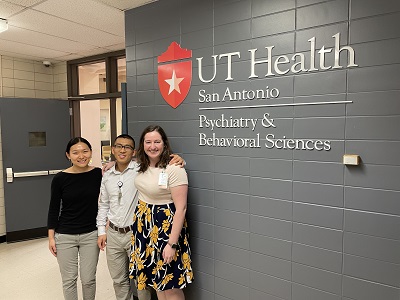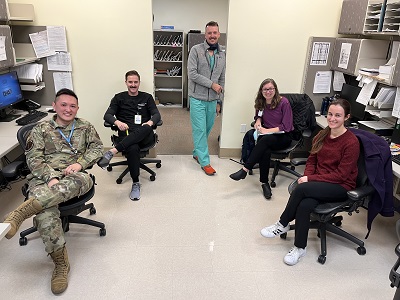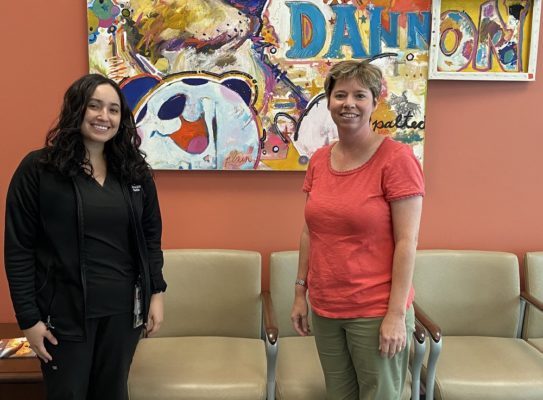
General Psychiatry Residency Program: Psychotherapy Training
Psychotherapy Training
 Psychotherapy is intrinsic to all patient encounters, whether it be soothing distress with an inpatient admission or improving self-esteem over time in your clinic. From day one, the diversity of hospital settings here gives you the opportunity to develop as a therapist through experiences like: collaborating on goal-setting with unfunded patients at our community hospital; learning to incorporate patient strengths and needs into your formulations at our Veteran’s hospital; and applying basic therapeutic interventions at the military hospital’s inpatient unit. This provides a foundation for your outpatient psychotherapy training, from PGY2 through PGY4, where you’ll start incorporating your growing theoretical knowledge to longitudinal, weekly cases. The end-result is proficiency in the three ACGME-designated core psychotherapies, namely supportive, cognitive-behavioral, and psychodynamic. All of this is further supplemented by the breadth of faculty expertise in different modalities–which creates a wealth of elective opportunities–and by national awards aimed at bolstering training, like the 2021-2022 American Association for Psychoanalysis and Dynamic Psychiatry (AAPDP) Distance Learning Program.
Psychotherapy is intrinsic to all patient encounters, whether it be soothing distress with an inpatient admission or improving self-esteem over time in your clinic. From day one, the diversity of hospital settings here gives you the opportunity to develop as a therapist through experiences like: collaborating on goal-setting with unfunded patients at our community hospital; learning to incorporate patient strengths and needs into your formulations at our Veteran’s hospital; and applying basic therapeutic interventions at the military hospital’s inpatient unit. This provides a foundation for your outpatient psychotherapy training, from PGY2 through PGY4, where you’ll start incorporating your growing theoretical knowledge to longitudinal, weekly cases. The end-result is proficiency in the three ACGME-designated core psychotherapies, namely supportive, cognitive-behavioral, and psychodynamic. All of this is further supplemented by the breadth of faculty expertise in different modalities–which creates a wealth of elective opportunities–and by national awards aimed at bolstering training, like the 2021-2022 American Association for Psychoanalysis and Dynamic Psychiatry (AAPDP) Distance Learning Program.
Psychotherapy Core Training Experiences:
 PGY-1: During the two-month rotation at the San Antonio Military Medical Center (SAMMC) inpatient psychiatric unit, interns take part in an Introduction to Psychotherapy program. Here they follow one patient, at least weekly, in individual therapy, to gain exposure to therapeutic encounters, modalities, and techniques. Residents attend weekly group supervision scheduled with staff or upper-level residents, as well as structured lectures (Why Psychotherapy?; Techniques, Tips and Tools; and High Yield Concepts in Psychotherapy) led by upper-levels. They also attend process groups led by social work staff. This early experience is foundational in understanding the central role the therapeutic relationship plays in all settings.
PGY-1: During the two-month rotation at the San Antonio Military Medical Center (SAMMC) inpatient psychiatric unit, interns take part in an Introduction to Psychotherapy program. Here they follow one patient, at least weekly, in individual therapy, to gain exposure to therapeutic encounters, modalities, and techniques. Residents attend weekly group supervision scheduled with staff or upper-level residents, as well as structured lectures (Why Psychotherapy?; Techniques, Tips and Tools; and High Yield Concepts in Psychotherapy) led by upper-levels. They also attend process groups led by social work staff. This early experience is foundational in understanding the central role the therapeutic relationship plays in all settings.
PGY-2 through PGY-4: Throughout these three years, trainees have a protected half-day each week for psychotherapy clinic. Civilian residents spend this time at the UT Health San Antonio Advance Clinic, working with adults and adolescents. Military residents spend PGY-2 and PGY—3 year at the Advance Clinic, then transition during their PGY-4 year to the Wilford Hall Ambulatory and Surgical Center (WHASC) Psychotherapy Clinic, at Lackland Air Force Base. During this time, opportunities are also available for residents to use elective time for additional psychotherapy training and supervision under a multitude of Attending Psychiatrists with varying sub-specialty training as well as our Psychology colleagues who are true psychotherapy experts.
PGY-4 Audie L Murphy VA Hospital Group Therapy: This selective gives residents the opportunity to gain experience in group- and individual therapeutic interventions at a higher level of outpatient care.
Therapy Didactics:

Motivational Interviewing (6 weeks/12 hours):
This course is co-taught by David Roberts, PhD and Jason Schillerstrom, MD during the PGY-1 year. It involves team-based learning didactics teaching core principles of motivational interviewing to elicit behavior change. The workshop component of the course allows for interns to simulate patient-therapist interactions to practice reflections, summarizing statements, and building ambiguity towards change.
Cognitive Behavioral Therapy (CBT) and Case Conference (4 weeks/8 hours in PGY-1 year and 6 weeks/12 hours in PGY-2 year):
David Roberts, PhD and Casey Thornton, PhD lead this course on the discussion of the theory, techniques, outcome measures, and patient selection for CBT now introduced in the PGY-1 year, with more in-depth review/case conference in PGY-2 year.
Transition to PGY-2/Practical Outpatient Psychotherapy (2 weeks/8 hours):
Carlos Velez, MD and Sara Noble, MD bridge the transition to PGY-2 year with a focused and high-yield guide to navigating outpatient psychotherapy, in anticipation of starting Advance Clinic week 1 of PGY-2 year. This consists largely of resources, Epic tips/tricks, time management, and prescribing medications in the outpatient setting.
Personality Disorders and Dialectical Behavioral Therapy (5 weeks, 10 hours):
Lisa Kilpela, PhD and Carlos Velez, MD lead this newly integrated course (previously available as a selective) on the basic tenets and methods for utilizing DBT as an individual psychotherapist, with an overview of the various skills integral to the DBT curriculum.
Introduction to Psychodynamic Psychotherapy (4 weeks/8 hours):
Carlos Velez, MD and Dave Roberts, PhD share teaching responsibilities for this course introducing psychodynamic principles during the PGY-2 year. Participants learn to identify affect, transference, countertransference, and unconscious elements, and begin to appreciate different phases of treatment. Practical exercises center on building a psychodynamic formulation and how to listen to your patient in a session.
Trauma-Focused Therapy (4 weeks/8 Hours)
Elisa Medellin, LPC and Carlos Velez, MD work with PGY-3 and PGY-4 residents in a case-based learning format. This course uses principles from the Cognitive Processing Therapy as well as Prolonged Exposure Therapy to lay the groundwork for working with patients with significant past trauma.
Couple/Family Systems Therapy (2 weeks/4 hours):
Tabatha Blount, PhD teaches the basic principles of marital and couples therapy during the PGY-4 year, with emphasis on family systems and conflict resolution.
Psychotherapy Elective Opportunities:
 Individual Child and Adolescent Psychotherapy – Residents with a special interest in Child and Adolescent Psychiatry can partner with CAP-trained faculty (as resident Mayra Valdivia Carlisle did with Dr. Tracy Schillerstrom, pictured here) to conduct short-term individual psychotherapy with this patient population.
Individual Child and Adolescent Psychotherapy – Residents with a special interest in Child and Adolescent Psychiatry can partner with CAP-trained faculty (as resident Mayra Valdivia Carlisle did with Dr. Tracy Schillerstrom, pictured here) to conduct short-term individual psychotherapy with this patient population.
DBT Skills Group – Residents co-lead this group over six months, where they learn how to instruct patients on distress tolerance, mindfulness, emotion regulation and interpersonal effectiveness
Adolescent Psychodynamic Therapy Group – Residents co-lead this group over six months, where they learn group processes and adolescent psychology.
Crisis Intervention Service: “The Living Room” – The Living Room is a community crisis respite program offering people in crisis an alternative to emergency departments. Upon completion of the DBT and Crisis Intervention Skills selective, residents can spend elective time in this walk-in service providing appropriate interventions to patients in distress.
Anxiety & Depression Group – Residents co-lead this weekly CBT-based group providing patients with support, an outlet for shared experience, and an improved understanding of symptoms.
Stress Management Group – Residents co-lead this weekly Mindfulness-Based Stress Reduction (MBSR) group, where patients learn how to decrease stress, lower anxiety and depression, regulate sleep, improve brain function and increase skills for managing chronic illness.
Cognitive Adaptation Training (CAT) – Residents work alongside CAT therapists in this psychosocial treatment using environmental supports such as signs, checklists, electronic devices and the organization of belongings to cue and sequence adaptive behavior in the home or work environment for patients with serious mental illness.
Other Psychotherapy Elective – Residents have the opportunity to design their own elective. Past topics include advanced supervision and training in CBT, PE, CPT, and psychodynamic therapy.
